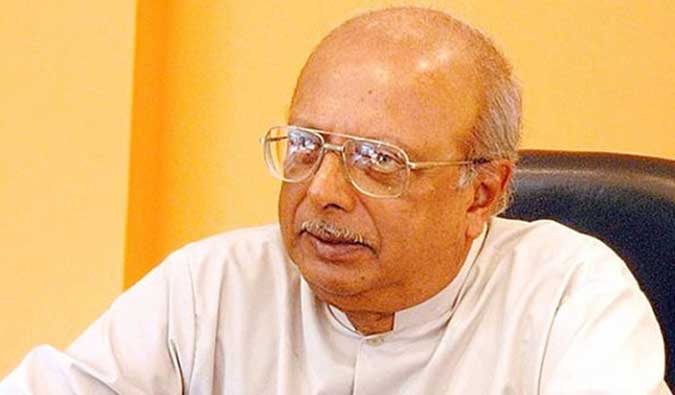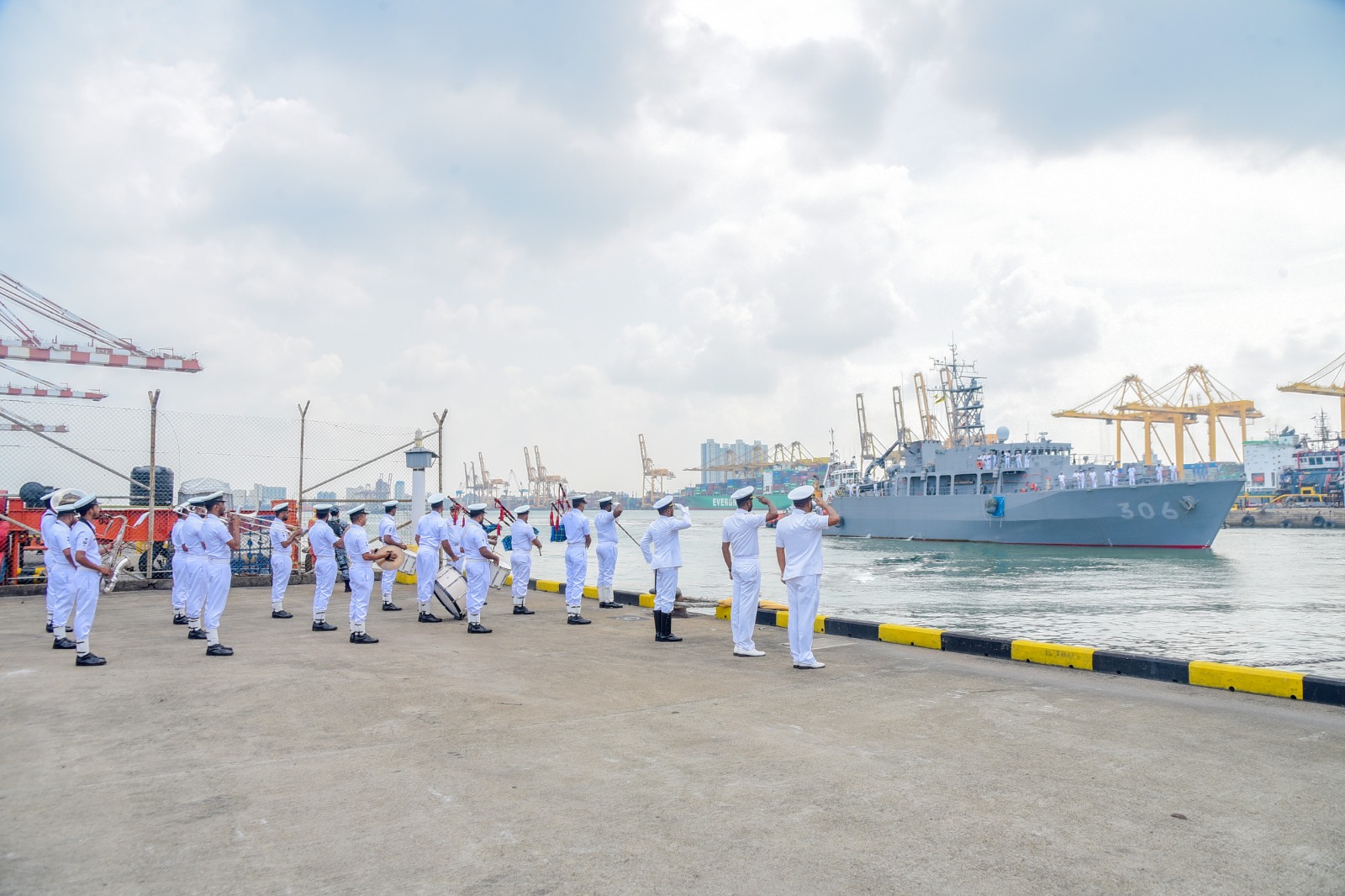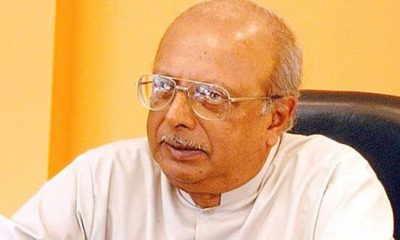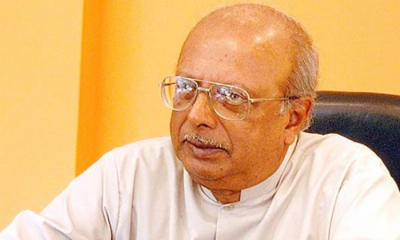News
‘Govt must hide its head in shame for allowing the crisis to deepen’

by Prof.TISSA VITARANA
Looking back at 2022, Sri Lanka cannot look forward to 2023, with any sense of hope. The economic, social and political crisis deepens without any clear plan by the Government to emerge from the crisis. Inflation is increasing with the Government, which is short of money due to its reluctance to tax the rich, resorting to massive printing of currency notes. This rise in the cost of living is fed by the support given to the private traders and big rice mill owners to fleece the cultivator and the producer who are in perpetual debt to them on the one hand and the consumer on the other. Survey data indicates that more than 65% of families live below the poverty line and that the malnutrition rate has approached 20%. Thus one out of five children below five years of age is suffering from severe under nutrition, and are both physically stunted and thin, but also mentally defective.
The future generation will be badly affected. Thus people with fixed or diminishing incomes faced with the high cost of living are suffering from hunger. In many families the parents have one meal a day and the children two, but the meals lack protein which is essential for development as well as vitamins and key minerals. Rampant bribery and corruption in the Administrative service has added to the suffering of the average person in his daily life; it is no longer a Public Service, it only serves the rich, the crooks and those with influence Instead of Government action to stop this exploitation by the middleman, like strengthening the Cooperative Movement among producers and consumers, reviving the Marketing and Food Control Departments, the Government supports the exploiter, rather than the exploited.
Ranil Wickremasinghe (RW) as Finance Minister tries to control the inflation by increasing the bank interest rate to a massive 30%. This not only deters the startup of new companies but also hits the established ones. The outcome of these policies is that the economy will continue to shrink, with more closures and job losses in the private sector together with the near complete stop to infrastructure development in the public sector. RW claimed that he would revive the economy through the private sector but his policies are undermining the private sector. The lack of jobs especially among the youth is leading to their leaving the country in huge numbers. The brain drain among professionals like doctors due to wrong tax policies is also increasing in an alarming manner. The youth that remain are driven to illicit activities like drug addiction and trafficking, and prostitution. Criminal activities like robberies, petty thefts, abductions, rape, assaults and murders are increasing so that people fear to venture out, especially after dark. Conflicts within families and between families and among criminal gangs are increasing. In society as a whole the collective cooperative spirit is being replaced by neoliberal individualism. Social cohesion is being lost. There is a complete breakdown of law and order.
The policy of taking more and more foreign loans is being persisted with. But even the International Monetary Fund (IMF) has yet to come forward with any part of its promised 3.9 billion US dollar (USD) aid package, despite several months of negotiations. Even if we get the IMF loan it will be too little too late. The terms demanded, if fully implemented, will reverse all the gains of the post-1956 era towards building a national economy as a sovereign independent state and emerge from our colonial past. The IMF demands would lead to de-nationalization and privatization of state-owned enterprises, but worst of all to the ownership passing over even to foreign hands. Sri Lanka would become a neo-colony subject to direct Imperialist exploitation once again.
The Government expects that by bowing down to the IMF terms Sri Lanka would be able to access more multilateral and bilateral loans and emerge from the dollar crisis and restore the ability to import using letters of credit from local banks. But getting deeper into foreign debt, which is the main cause of our dollar shortage and crisis, will only make matters worse. In 2021 we had to pay USD seven billion to service our 52 billion USD foreign debt, and Sri Lanka will be drawn further into the foreign debt trap. The fact that nearly 50% of the foreign loans are International Sovereign Bonds (which are short term high interest private loans) which are difficult to re-negotiate to delay payment makes matters worse. To further aggravate the situation the ban on the import of half of over 1500 non-essential items by this Government has been lifted recently. The dollar shortage will get worse and the fuel and gas queues will return and the shortage and high price of medicines and essential food items will also continue to rise.
The wrong policies of the present Government should be radically changed. There must be “a system change”. The way to increase productivity and national income is not by going back to the purely profit oriented privatization policy, but to move with the times and turn to a solidarity economy, as in Scandinavia and some provinces in Germany. In our agricultural economy the biggest export income earner is tea. But the private companies say they are running at a loss and cannot pay the employees a living wage. After 5 years of struggle the employees won a wage increase, the total allowance was raised to Rs.1000/day. But the employees are now being forced to increase their green leaf quota from 18 kilos per day to an impossible 24 kilos.
Even if they provide 20 or even 22 kilos, their pay is cut by Rs 50 per Kg, so that they are back to the status quo ante. We must learn from Kerala, India, where the solidarity economy is now in action. The ownership has been given to the employees by the Left regime, and as owners with shares in the company, in addition to their salary, they have increased the output tremendously and produce a large profit, which also benefits the society.
The present Government should also promote value added industry based on local raw material. I am happy to mention that as Minister of Science and Technology I developed the nanotechnology centre, SLNTEC, which can do this. In addition I was happy to learn that the Vidatha Centres for the development of SMEs in every Division have now topped the mark of thousand entrepreneurs that have successfully exported their products. Thus the answer is to make Sri Lanka an industrialized exporter of finished products.
Latest News
Duo of JMSDF ships arrive in Colombo

The Japan Maritime Self-Defence Force (JMSDF) BUNGO and ETAJIMA arrived at the port of Colombo on a goodwill visit this morning (01 Apr 25).
The visiting ships were welcomed by the Sri Lanka Navy in compliance with naval traditions.
The 141m long JMSDF BUNGO is an Uraga-Class Minesweeper Tender commanded by Commander TANAKA Koji and the ship is manned by a crew of 125.
Meanwhile, JMSDF Etajima, a 65-meter-long Minesweeper, is under the command of Commander Oda Takayuki and operates with a crew of 54 personnel.
During the stay in the island, crew members of the ships will explore some tourist attractions within the city of Colombo. The ships are scheduled to set sail from Colombo on 04 Apr.
News
Underworld leader threatens police over arrest of his father and brother

“You and your families will be eliminated”
By Norman Palihawadane and Hemantha Randun
A full-scale investigation has been launched to track down an underworld character, ‘Navy Dinesh,’ a key accomplice of Ganemulle Sanjeewa, for issuing death threats over the phone to three police officers, including the Gampaha HQI, Crime Branch OIC, of the same police station, and others.
Navy Dinesh is believed to have fled the country.
According to police sources, threats were issued following the arrest of Navy Dinesh’s father and brother in connection with a drug trafficking case.
Phone analysis reports have confirmed that the calls originated from Dubai and France.
Following the murder of Ganemulle Sanjeewa, Navy Dinesh assumed leadership of the underworld gang he had previously been involved with.
Navy Dinesh contacted the Gampaha HQI, the OIC of the Crime Branch, and the investigating police constable, and threatened to kill them and their family members. “You and your families will be eliminated,” he said.
A special police team had been assigned to investigate the matter, and a report has been submitted to the courts, police sources said.
News
Visit to Hamburg: PM Amarasuriya showcases positive investment climate

Prime Minister Dr. Harini Amarasuriya highlighted the significant potential for strengthening the economic ties between Sri Lanka and Germany. Premier Amarasuriya underscored the country’s improving economy, resurgent tourism and policy reforms that have fostered an attractive environment for investment and business.
Premier Amarasuriya said so at the annual gathering of the German Asia-Pacific Association (OAV) in Hamburg, Germany. She declared Germany is both a role model and an important partner in the further development of vocational education in Sri Lanka.
German Federal President Frank-Walter Steinmeier and Premier Amarasuriya attended the annual gathering of the German Asia-Pacific Association (OAV) as Guests of Honour.
Dr. Amarasuriya said: “For the first time in Sri Lanka’s history, the results of the Parliamentary elections held last year reflected a collective and unified voice from people of all regions of the country” and highlighted that the new government is committed to taking tangible steps in the interest of further advancing national unity and reconciliation. She also highlighted that the current Parliament, which was formed after the election, is one of the most inclusive in Sri Lanka’s history, with a record number of women and representatives of different communities.
During her visit to Hamburg, the Prime Minister held a bilateral meeting with Federal President Frank-Walter Steinmeier.
Premier Amarasuriya also attended the ‘German-Asian Forum on Vocational Education & Training’ organised by the OAV. In a keynote speech at this forum, she conveyed Sri Lanka’s appreciation to German government’s assistance to uplift the vocational education sector in Sri Lanka which date back to the establishment in 1959 of the Sri Lanka-German Technical Training Institute in Moratuwa, Sri Lanka, one of the milestones of the bilateral relationship. She stated that Sri Lanka aims to transform vocational education into a modern, relevant field that will help us create a skilled workforce that meets the demands of the industry, and which offer the youth of Sri Lanka real career paths, both in Sri Lanka and abroad.
She also took part in a Business Roundtable with over 20 member companies of OAV and visited German research and technology hubs in the city including ITECH, a vocational school for IT, electrical, and chemical engineering; NXP Semiconductors, a leading global semiconductors company; and DESY, Germany’s largest accelerator centre.
OAV is active in Sri Lanka through the BMO Membership Organisation Partnership Programme in Jaffna, which is a collaboration between the OAV and the Northern Chamber of Industries (NCI), and the Women’s Chamber of Industry and Commerce (WCIC) in Colombo. The programme aims to strengthen the competence and engagement of small and medium-sized enterprises in relation to public institutions and is supported by the German Federal Ministry for Economic Cooperation and Development (BMZ).
In a 20-minute address German Federal President Frank-Walter Steinmeier made a strong case for establishing future-oriented partnerships with countries in the Asia-Pacific region. According to Steinmeier, such action is urgently needed to reduce asymmetries and dependencies and mitigate the effects of increasing protectionism in world trade. To achieve this, it is important to better exploit the diverse opportunities in the dynamic region, Steinmeier said.
The remarks came during Steinmeier’s keynote speech during the traditional “East Asia friendship dinner” held in the ballroom of Hamburg City Hall. The event was hosted by the German Asia-Pacific Business Association (OAV), which is celebrating its 125th anniversary this year.
“Recently, we have been forced to witness how close friends and allies are turning away from the order they played such a crucial role in establishing, and are celebrating wilfulness as progress,” Steinmeier noted. “The 102nd East Asia friendship dinner and 125 years of the German Asia-Pacific Business Association stand for something that might seem old-fashioned at first glance in our time but is all the more important in a time of crisis: partnership.”
Within this partnership framework, Steinmeier highlighted the vast opportunities the Asian market presents for Germany. “We will continue to diversify our foreign trade, reduce our economic and security policy dependencies, and forge closer political contacts with a larger number of countries, including in the area of trade policy,” Steinmeier said.
-

 Sports3 days ago
Sports3 days agoSri Lanka’s eternal search for the elusive all-rounder
-

 Features7 days ago
Features7 days agoCelebrating 25 Years of Excellence: The Silver Jubilee of SLIIT – PART I
-

 Business7 days ago
Business7 days agoCEB calls for proposals to develop two 50MW wind farm facilities in Mullikulam
-

 News4 days ago
News4 days agoGnanasara Thera urged to reveal masterminds behind Easter Sunday terror attacks
-

 Business5 days ago
Business5 days agoAIA Higher Education Scholarships Programme celebrating 30-year journey
-

 Features7 days ago
Features7 days agoNotes from AKD’s Textbook
-

 News3 days ago
News3 days agoComBank crowned Global Finance Best SME Bank in Sri Lanka for 3rd successive year
-

 News2 days ago
News2 days agoBid to include genocide allegation against Sri Lanka in Canada’s school curriculum thwarted















